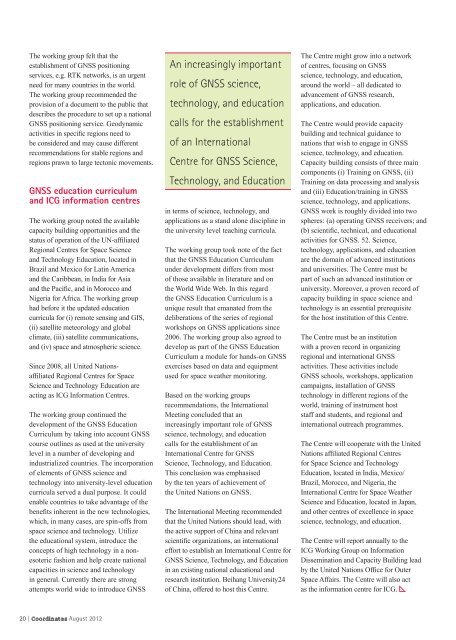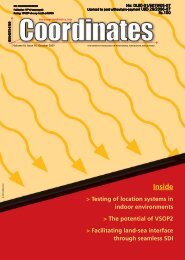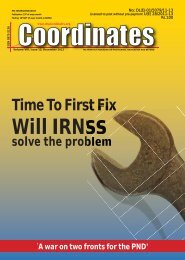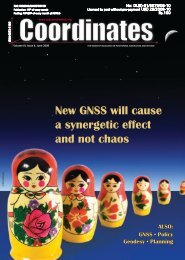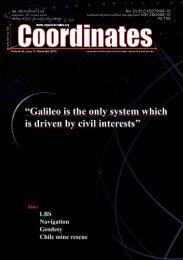Download - Coordinates
Download - Coordinates
Download - Coordinates
You also want an ePaper? Increase the reach of your titles
YUMPU automatically turns print PDFs into web optimized ePapers that Google loves.
The working group felt that the<br />
establishment of GNSS positioning<br />
services, e.g. RTK networks, is an urgent<br />
need for many countries in the world.<br />
The working group recommended the<br />
provision of a document to the public that<br />
describes the procedure to set up a national<br />
GNSS positioning service. Geodynamic<br />
activities in specifi c regions need to<br />
be considered and may cause different<br />
recommendations for stable regions and<br />
regions prawn to large tectonic movements.<br />
GNSS education curriculum<br />
and ICG information centres<br />
The working group noted the available<br />
capacity building opportunities and the<br />
status of operation of the UN-affi liated<br />
Regional Centres for Space Science<br />
and Technology Education, located in<br />
Brazil and Mexico for Latin America<br />
and the Caribbean, in India for Asia<br />
and the Pacifi c, and in Morocco and<br />
Nigeria for Africa. The working group<br />
had before it the updated education<br />
curricula for (i) remote sensing and GIS,<br />
(ii) satellite meteorology and global<br />
climate, (iii) satellite communications,<br />
and (iv) space and atmospheric science.<br />
Since 2008, all United Nationsaffi<br />
liated Regional Centres for Space<br />
Science and Technology Education are<br />
acting as ICG Information Centres.<br />
The working group continued the<br />
development of the GNSS Education<br />
Curriculum by taking into account GNSS<br />
course outlines as used at the university<br />
level in a number of developing and<br />
industrialized countries. The incorporation<br />
of elements of GNSS science and<br />
technology into university-level education<br />
curricula served a dual purpose. It could<br />
enable countries to take advantage of the<br />
benefi ts inherent in the new technologies,<br />
which, in many cases, are spin-offs from<br />
space science and technology. Utilize<br />
the educational system, introduce the<br />
concepts of high technology in a nonesoteric<br />
fashion and help create national<br />
capacities in science and technology<br />
in general. Currently there are strong<br />
attempts world wide to introduce GNSS<br />
20 | <strong>Coordinates</strong> August 2012<br />
An increasingly important<br />
role of GNSS science,<br />
technology, and education<br />
calls for the establishment<br />
of an International<br />
Centre for GNSS Science,<br />
Technology, and Education<br />
in terms of science, technology, and<br />
applications as a stand alone discipline in<br />
the university level teaching curricula.<br />
The working group took note of the fact<br />
that the GNSS Education Curriculum<br />
under development differs from most<br />
of those available in literature and on<br />
the World Wide Web. In this regard<br />
the GNSS Education Curriculum is a<br />
unique result that emanated from the<br />
deliberations of the series of regional<br />
workshops on GNSS applications since<br />
2006. The working group also agreed to<br />
develop as part of the GNSS Education<br />
Curriculum a module for hands-on GNSS<br />
exercises based on data and equipment<br />
used for space weather monitoring.<br />
Based on the working groups<br />
recommendations, the International<br />
Meeting concluded that an<br />
increasingly important role of GNSS<br />
science, technology, and education<br />
calls for the establishment of an<br />
International Centre for GNSS<br />
Science, Technology, and Education.<br />
This conclusion was emphasised<br />
by the ten years of achievement of<br />
the United Nations on GNSS.<br />
The International Meeting recommended<br />
that the United Nations should lead, with<br />
the active support of China and relevant<br />
scientifi c organizations, an international<br />
effort to establish an International Centre for<br />
GNSS Science, Technology, and Education<br />
in an existing national educational and<br />
research institution. Beihang University24<br />
of China, offered to host this Centre.<br />
The Centre might grow into a network<br />
of centres, focusing on GNSS<br />
science, technology, and education,<br />
around the world – all dedicated to<br />
advancement of GNSS research,<br />
applications, and education.<br />
The Centre would provide capacity<br />
building and technical guidance to<br />
nations that wish to engage in GNSS<br />
science, technology, and education.<br />
Capacity building consists of three main<br />
components (i) Training on GNSS, (ii)<br />
Training on data processing and analysis<br />
and (iii) Education/training in GNSS<br />
science, technology, and applications.<br />
GNSS work is roughly divided into two<br />
spheres: (a) operating GNSS receivers; and<br />
(b) scientifi c, technical, and educational<br />
activities for GNSS. 52. Science,<br />
technology, applications, and education<br />
are the domain of advanced institutions<br />
and universities. The Centre must be<br />
part of such an advanced institution or<br />
university. Moreover, a proven record of<br />
capacity building in space science and<br />
technology is an essential prerequisite<br />
for the host institution of this Centre.<br />
The Centre must be an institution<br />
with a proven record in organizing<br />
regional and international GNSS<br />
activities. These activities include<br />
GNSS schools, workshops, application<br />
campaigns, installation of GNSS<br />
technology in different regions of the<br />
world, training of instrument host<br />
staff and students, and regional and<br />
international outreach programmes.<br />
The Centre will cooperate with the United<br />
Nations affi liated Regional Centres<br />
for Space Science and Technology<br />
Education, located in India, Mexico/<br />
Brazil, Morocco, and Nigeria, the<br />
International Centre for Space Weather<br />
Science and Education, located in Japan,<br />
and other centres of excellence in space<br />
science, technology, and education.<br />
The Centre will report annually to the<br />
ICG Working Group on Information<br />
Dissemination and Capacity Building lead<br />
by the United Nations Offi ce for Outer<br />
Space Affairs. The Centre will also act<br />
as the information centre for ICG.


